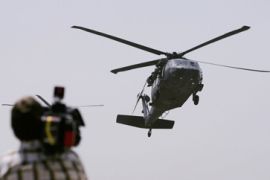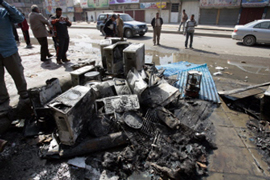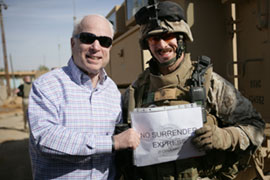War slips down US election agenda
Economic woes and media coverage blamed as the US loses interest in Iraq.

 |
| The “surge” is key to US perceptions on Iraq and the war [GALLO/GETTY] |
It has dragged on for five years, cost almost 4000 US lives and, a new book says, will ending up costing $3 trillion dollars – but the war in Iraq is not the most important issue for US election candidates or voters.
Opinion polls consistently put the US economy, now teetering on the brink of recession, at the top of their list of priorities.
A recent CNN/Opinion Research Corporation poll on election issues had only 21 per cent identifying Iraq as the most important problem facing the US.
And some Democrats and Republicans agree on who is partly to blame – the US media.
“The surge is apparently working – violence is down and American deaths are down,” says Brad Blakeman, a former deputy assistant to George W Bush.
“Once it has been taken off the headlines people tend to focus on those matters domestically that are important to them like the economy and the election.”
‘Hoodwinked’
The so-called surge, in which tens of thousands of additional US troops were sent to Baghdad last year, is at the heart of the change in US perceptions on Iraq.
 |
| Reported violence has increased in Iraq in recent weeks [AFP] |
The US military has said the violence in Iraq has dropped since the surge, but critics argue that it was actually a US move to pay Sunni fighters to attack al-Qaeda and Shia leader Muqtada al-Sadr’s decision to call a ceasefire that really lay behind a reported drop in deaths.
Democrats also acknowledge the power of the surge, but say that it “hoodwinked” many in the US media into believing that the situation in Iraq is improving.
“Many voices in the media have become convinced that the so-called surge is working, says Cliff Schechter, a Democratic consultant who worked on Bill Clinton’s 1996 campaign.
“But Baghdad is still not safe, most of Iraq is not safe and there are many issues and problems. But they [the media] only pay attention to the statistics and they have been hoodwinked.”
Declining coverage
A recent poll suggests that those critical of the media coverage may be right about its impact.
|
“If there are signs of the surge working the media will report that – if there are suicide bombings every day the media will report that” Ken Rudd, National Public Radio |
According to a survey conducted by the Project for Excellence in Journalism, the number of news stories devoted to Iraq had dropped sharply since last year, from an average of 15 per cent of available coverage in July 2007 to just three per cent in February.
The Pew Center for Research and the Press says that public interest in Iraq also dropped during the same period.
According to their survey, Iraq was the most closely followed news story in the US in all but five weeks during the first half of 2007 – however, people paid it less attention between July 2007 and February 2008.
However Ken Rudd, political editor at National Public Radio, disagrees that the media is to blame for Iraq dropping down the election agenda.
“I don’t think the sense among the media is that the war has gotten better or more palatable, I just think it is a question of what has overtaken the attention of the American public. The war has not disappeared at all as a key issue.
“If there are signs of the surge working the media will report that. If there are suicide bombings every day the media will report that. If polls suggest…that a majority of people are opposed to the war the media will report that too.”
Presidential positions
The success or failure of the surge is likely to be at the heart of what has become a three-way election battle for the presidency.
John McCain, the Republican candidate, has put Iraq and national security issues at the centre of his campaign.
A firm backer of the “surge”, McCain has called for more troops to be sent to Iraq if necessary, saying that the US could stay in Iraq for 100 years.
|
|
| John McCain is committed to keeping US troops in Iraq [AFP] |
“The Republican party will stress that surrender is not an option and that victory is our only option,” says Blakeman.
“We’ve got to stabilise Iraq and ask them to be able to govern themselves and protect themselves.”
But a Republican campaign based on the success of the surge could prove a dangerous gamble if it stops being perceived to be working and violence in Iraq once again begins to rise, as it has in recent weeks.
“As John McCain talks more about Iraq and tries to convince people its terrific, the media are going to have to pay more attention to what’s going on there,” says Schechter.
Both Democratic candidates – Hillary Clinton and Barack Obama – support a withdrawal of US troops from Iraq, although they have clashed over the timetable.
Clinton says she will begin troop withdrawals 60 days after she is elected but gives no timetable for a pullout.
Barack Obama, however, says all US combat troops will be out of Iraq within 16 months.
Clinton’s decision to support the war in 2002 has cost her in terms of credibility and allowed Obama to seem far-sighted and principled in opposing it from the start.
Sick and tired
Anti-war campaigners are quick to blame the media for the public’s declining interest in Iraq, but also say the US government has not helped.
“This administration has done a remarkable job in confusing the issue as much as possible,” says Andy Shallal, an Iraqi-American activist based in Washington DC.
“We have gone from build-up to surge to pause to re-tool to re-deploy and people just get tired of hearing the same story over and over again.”
Shallal, like others Al Jazeera spoke to, points out that after five years many people in the US are just fatigued, not only by the coverage but the war itself.
Like many people around the world, they are just tired of the conflict.
